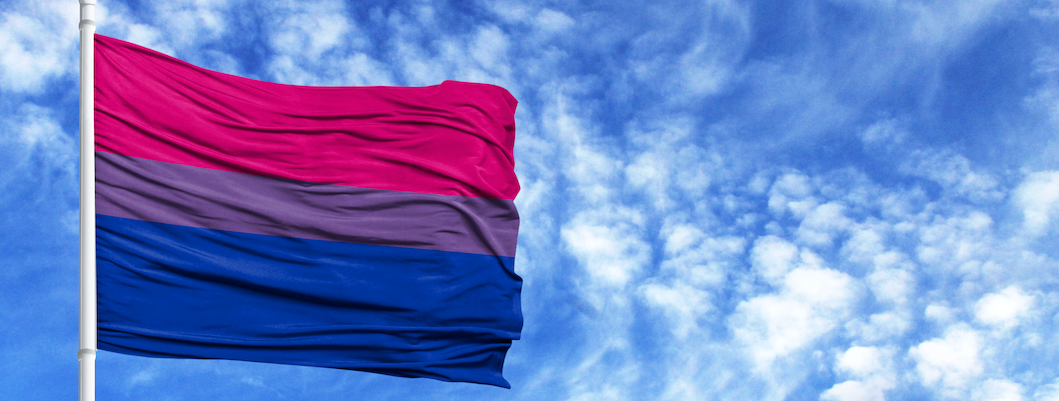Original Article by SIG Members
Celebrating the Positive Aspects of Being Bi+
Cindy J. Chang, Psy.M., Graduate School of Applied and Professional Psychology, Rutgers University
Alexandra M. King, M.S., Department of Psychology, Rutgers University
Brian A. Feinstein, Ph.D., Department of Psychology, Rosalind Franklin University of Medicine and Science
September 23, 2020
Celebrating the Positive Aspects of Being Bi+
Cindy J. Chang, Psy.M., Graduate School of Applied and Professional Psychology, Rutgers University
Alexandra M. King, M.S., Department of Psychology, Rutgers University
Brian A. Feinstein, Ph.D., Department of Psychology, Rosalind Franklin University of Medicine and Science
September 23, 2020
Today is Bisexual Visibility Day—a day to celebrate the bisexual community! The broader bi+ community makes up more than half of the sexual minority community and includes anyone who is attracted to people of more than one sex/gender or regardless of sex/gender (e.g., people who identify as bisexual, pansexual, queer, or fluid). The bi+ community is also diverse, including people of all races, ethnicities, genders, religious identities, etc., and bi+ individuals’ experiences can vary greatly across these intersections.
Discussions of bi+ experience often focus on negative aspects (e.g., increased risk for depression, anxiety, and other mental health problems compared to heterosexual and gay/lesbian people).1-3 Bi+ people face biphobia and discrimination from both heterosexual and gay/lesbian people, and this can make it hard for some bi+ people to feel good about themselves and their identities. However, being bi+ is not inherently negative.
Many bi+ people do feel good about themselves and even experience their identities as positives in their lives. In honor of Bisexual Visibility Day, we would like to share some of the positive aspects of being bi+ that have been described by participants in research studies:
Discussions of bi+ experience often focus on negative aspects (e.g., increased risk for depression, anxiety, and other mental health problems compared to heterosexual and gay/lesbian people).1-3 Bi+ people face biphobia and discrimination from both heterosexual and gay/lesbian people, and this can make it hard for some bi+ people to feel good about themselves and their identities. However, being bi+ is not inherently negative.
Many bi+ people do feel good about themselves and even experience their identities as positives in their lives. In honor of Bisexual Visibility Day, we would like to share some of the positive aspects of being bi+ that have been described by participants in research studies:
|
3. Finding community with other bi+ people: When bi+ people connect with others who share their identities, it can help them to feel understood and supported. A participant in a research study described this as follows: “They [another bi+ person] reaffirmed for me that I’m not just crazy, the things I’m feeling are normal and real.”4,5
|
|
4. Engaging in advocacy and activism: For many bi+ people, engaging in advocacy and activism can be a great way to make lemonade out of lemons. Whether participating in marches, supporting others in the community, or advocating for more inclusive schools or workplaces, these acts can feel empowering while contributing to positive changes in society.5
|
These are just a few positive aspects of being bi+ that have been described by participants in research studies. Today, on Bisexual Visibility Day, if you personally identify as bi+, we encourage you to think about the ways in which being bi+ is a positive in your life. Does it feel good to love without the limits of sex and gender? Have you found a community that helps you celebrate your identity? If you can’t relate to these experiences, that’s okay too. We know that it can be hard to feel good about being bi+ for a number of reasons. If that’s true for you, then we hope that this article will remind you that you’re not alone and that there is strength and beauty in your identity.
If you do not personally identify as bi+, you can still play an important role in helping to celebrate the bi+ community today and every day. You can be an ally to the bi+ community by thinking about and challenging your own biases, calling out biphobia when you see it, and showing up for people who are bi+.
Happy Bisexual Visibility Day from us to you!
If you do not personally identify as bi+, you can still play an important role in helping to celebrate the bi+ community today and every day. You can be an ally to the bi+ community by thinking about and challenging your own biases, calling out biphobia when you see it, and showing up for people who are bi+.
Happy Bisexual Visibility Day from us to you!
References:
- Salway, T., Ross, L. E., Fehr, C. P., Burley, J., Asadi, S., Hawkins, B., & Tarasoff, L. A. (2019). A systematic review and meta-analysis of disparities in the prevalence of suicide ideation and attempt among bisexual populations. Archives of Sexual Behavior, 48(1), 89–111. https://doi.org/10.1007/s10508-018-1150-6
- Cochran, S. D., Sullivan, J. G., & Mays, V. M. (2003). Prevalence of mental disorders, psychological distress, and mental health services use among lesbian, gay, and bisexual adults in the United States. Journal of Consulting and Clinical Psychology, 71(1), 53–61. https://doi.org/10.1037/0022-006X.71.1.53
- Rostosky, S.S., Riggle, E. D. B., Pascale-Hague D., & McCants, L. E. (2010). The positive aspects of a bisexual self-identification. Psychology & Sexuality, 1, 131-144. https://doi.org/10.1080/19419899.2010.484595
- Flanders, C. E., Tarasoff, L. A., Legge, M. M., Robinson, M., & Gos, G. (2017). Positive identity experiences of young bisexual and other nonmonosexual people: A qualitative Inquiry. Journal of Homosexuality, 64(8), 1014–1032. https://doi.org/10.1080/00918369.2016.1236592





